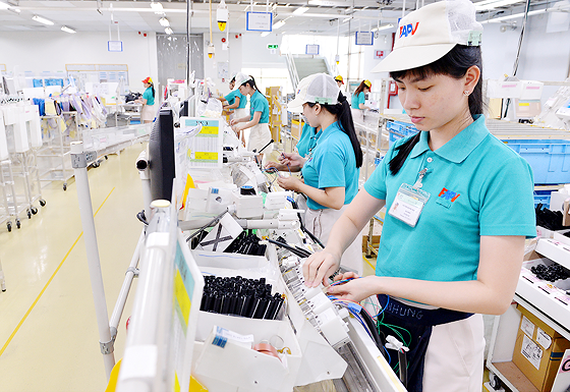 Economy
Economy


|
| A production line of a company at HCM City’s Tân Thuận EPZ. — VNS File Photo. |
HCM CITY — Erratic planning and other problems related to land use is hurting the business sector, according to the HCM City Department of Industry and Trade.
The city has for long had a policy of shifting factories from residential areas in the inner city, but does not tell them to relocate to industrial parks (IPs) or export processing zones (EPZs). So, over the years, many have obtained licences from authorities to build factories in residential areas in suburban districts.
But with these areas seeing rapid urbanisation and population growth, having factories there has become untenable.
As a result, authorities have had to amend land-use plans in these areas, putting companies that have scrupulously abided by city regulations in jeopardy.
Minh Phùng Plastics Joint Stock Co said in 2000, in response to the city’s policy to relocate factories from inner districts, it decided to build its plant on Ao Đội Street in Bình Tân District. However, under new plans, all the company’s facilities are situated on land designated as a park.
As a result, Minh Phùng Plastics Co is not allowed to mortgage the land for bank loans, especially now as it seeks to expand its market to other countries like New Zealand, the US, Australia and Thailand.
Other companies have reported problems when applying for construction licences to expand their manufacturing facilities.
A number of tenants at HCM City’s IPs and EPZs said they had not received land-use certificates because the developers of the zones had not fully paid land-use taxes.
The Saigon Food Joint Stock Company had purchased a plot of land in the Vĩnh Lộc Industrial Park four years ago, but has yet to receive the land-use certificate transferred to its name by the previous owner.
Businesses also complain they are unable to seek business opportunities abroad and bid for public projects.
Phạm Thành Kiên, the director of the HCM City's Department of Industry and Trade, said this year city authorities intended to address the difficulties faced by the business sector.
The department would help businesses connect with overseas markets to enable them to expand abroad.
In the next seven months, it ưould collaborate with foreign business groups to take the city’s products to new markets and expand their sales in traditional markets like South Korea, Australia, Thailand and Europe.
To meet a rising demand for land from enterprises for their expansion, it has asked the city's administration to build more IPs and EPZs.
It has also urged enterprises to develop strategies to move into EPZs and IPs for their sustainable development. — VNS




